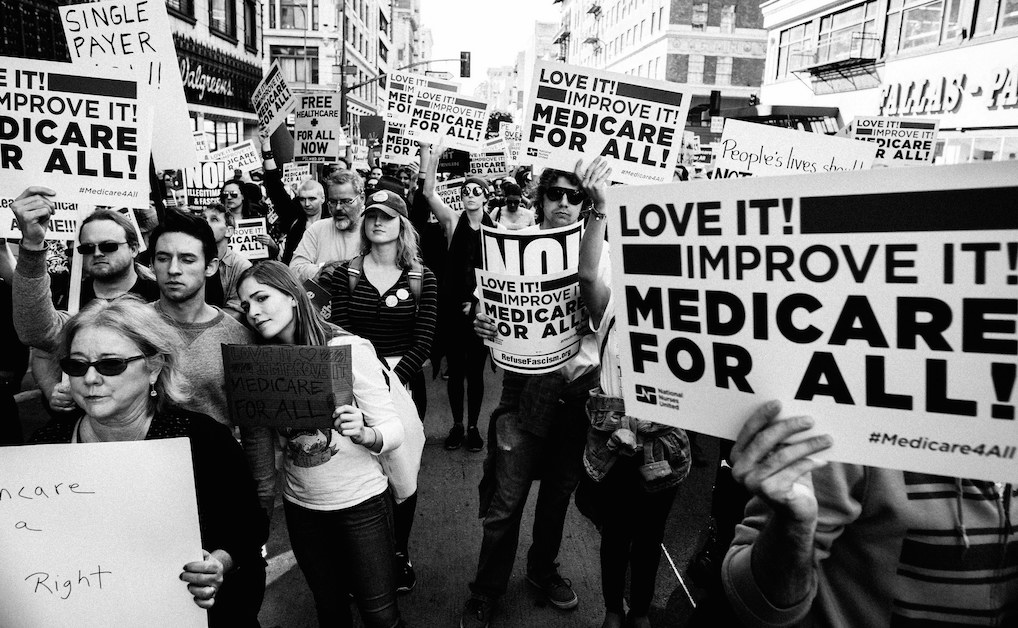Last week, as the media focused on U.S. President Donald Trump’s North Korea summit in Vietnam and the congressional testimony of his former personal lawyer Michael Cohen, a largely overlooked news conference took place, announcing legislation that could save millions of lives. Seattle Democratic Congresswoman Pramila Jayapal introduced the Medicare For All Act of 2019, the latest attempt to pass single-payer health care. Jayapal’s bill has 106 co-sponsors, close to half of the Democrats in the House.
Jayapal is the co-chair of the Congressional Progressive Caucus, the largest caucus in the House. Among the bill’s co-sponsors was Michigan Democrat Debbie Dingell. She replaced her late husband, John Dingell Jr., who was the longest-serving member of Congress in history, holding the seat since 1955. John Dingell, who died in February at the age of 92, was a stalwart backer of single-payer health care, introducing legislation yearly during his 60-year tenure. He was inspired by his father, John Dingell Sr., who held that same congressional seat for the 18 years before his son. Dingell Sr. first proposed single-payer health care in 1943.
With the new Congress this year, the most diverse in history, the 75-plus-year-long effort to secure universal health care may be at a tipping point. Whether or not it passes — considered unlikely with the Senate and White House under Republican control — single-payer health care will undoubtedly be a central issue in the 2020 presidential race.
“Is this a bold and ambitious plan? Damn straight it is, because it has to be,” Jayapal said as she announced the single-payer bill at a news conference outside the U.S. Capitol, standing in the cold, surrounded by colleagues and supporters. “The scale of our health-care crisis is enormous, and our plan has to tackle the deep sickness within our for-profit system. … If we can end slavery, if we can give women the right to vote, if we can send a man to the moon, then, God, we can do universal health care for every American.”
Medicare, passed in 1965, is a single-payer national insurance program that pays medical costs for people age 65 and older. Poll after poll confirms its popularity. Simply expanding eligibility from age 65 and over to the day we are born would create a single-payer system comparable to those in most other industrialized countries in the world.
On the rare occasions when “Medicare-for-all” advocates are interviewed on television, they are asked how much it costs. Fair enough, but what about the enormous costs of the current system? Speaking on the Democracy Now! news hour Wednesday, Jayapal said: “Our health-care system today costs 18 per cent of our GDP. In [the next] 10 years, we’re going to be spending $50 trillion on our current health-care system. … It’s not like we’re spending all this money and we have better outcomes than the rest of the world. The United States is last among all of our peers in infant mortality rates, in maternal mortality rates, in terms of our life expectancy.”
Economist Robert Pollin at the University of Massachusetts and his colleagues recently released a comprehensive analysis of “Medicare-for-all,” confirming that not only would it not be too expensive, but would actually deliver better outcomes for less money. “Overall U.S. health-care costs could fall by about 19 percent relative to the existing system,” they write. The cost savings factor in the increase in demand for health care, as close to 30 per cent of people in the U.S. are either uninsured or underinsured and, as a result, simply don’t seek medical treatment when they need it, or preventive care.
Jayapal and her co-sponsors may have an unexpected ally in their quest for Medicare-for-all. In his book titled The America We Deserve, published in the year 2000, American businessman Donald J. Trump wrote: “I’m a conservative on most issues but a liberal on this one. We should not hear so many stories of families ruined by health-care expenses. We must not allow citizens with medical problems to go untreated because of financial problems or red tape. The Canadian plan also helps Canadians live longer and healthier than America. We need, as a nation, to reexamine the single-payer plan, as many individual states are doing.”
The president endorsed single payer in 2000, but opposes it now. Whether or not he can be pushed to support it again, Jayapal is moving forward. She has support from Republican business owners and hospital executives, all who know the current for-profit health insurance system costs too much and fails the people of this country. For the increasingly large field of Democratic presidential hopefuls, “Medicare-for-all” has become a defining issue, embraced by many of the announced candidates.
After 75 years of debate, with health-care costs spiraling out of control and the quality of medical care falling short of that in single-payer countries, the time is right for Medicare-for-all. It’s a matter of life and death.
Amy Goodman is the host of Democracy Now!, a daily international TV/radio news hour airing on more than 1,300 stations. She is the co-author, with Denis Moynihan, of The Silenced Majority, a New York Times bestseller. This column originally appeared on Truthdig.
Photo: Molly Adams/Flickr
Help make rabble sustainable. Please consider supporting our work with a monthly donation. Support rabble.ca today for as little as $1 per month!




